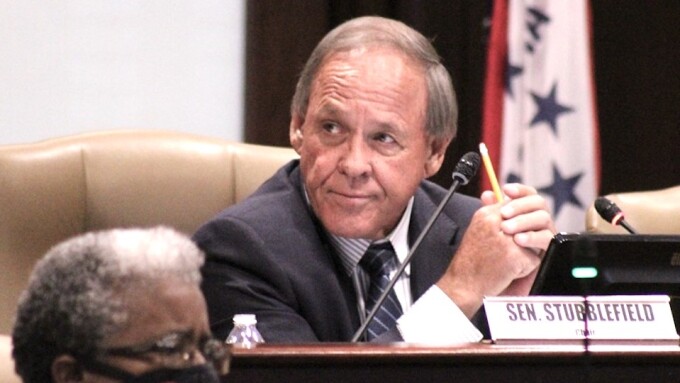LITTLE ROCK, Ark. — The Arkansas House endorsed Senate Bill 43 on Monday, after Republicans amended it to shift the focus of the legislation from restricting “drag performance” to restricting all “adult-oriented performances” in the state.
The amended bill, originally filed by Sen. Gary Stubblefield (R-Branch), passed 78-15 with two voting present, and now returns to the state Senate.
As XBIZ reported, Democratic state senators and LGBTQ+ advocates in Arkansas had raised concerns that SB 43 would limit the rights of transgender people and also redefine the legal concept of “prurient interest,” which is at the core of recent Republican attempts to reinstate obscenity prosecutions.
Although the amended bill no longer singles out shows “in which at least one performer exhibits a gender identity that is different from the performer's gender assigned at birth,” it expands the restriction based on a performance’s “appeal to the prurient interest.”
The amended SB 43 “looks a lot different than it initially did,” the Arkansas Times noted, adding that “the bill got completely overhauled in a House committee after Attorney General Tim Griffin apparently signaled that it was not likely to hold up in court.”
The bill now prohibits minors from attending any “adult-oriented” performance, which it defines as a performance intended to “appeal to the prurient interest and that features a person who appears in a state of nudity or is semi-nude; the purposeful exposure, whether complete or partial, of a specific anatomical area, or prosthetic genitalia or breasts; or a specific sexual activity.”
Fear and Loathing of 'San Francisco'
Co-sponsor Rep. Mary Bentley (R-Perryville) told the House that without the bill, it was not illegal for a child to go to a strip club, although as the Arkansas Times explained, “it effectively is because of alcohol laws.”
Before the vote, Bentley read a letter from a man who claimed he had “retired from the military with his family to Batesville because it was far away from the corrupting influences of big cities.” But after the Arkansas town held a Pride event, which according to the letter featured “a drag show in which genital areas were exposed,” the man now feared that small-town Arkansas would end up “becoming San Francisco.”
Dissenting, Rep. Tippi McCullough (D-Little Rock) told the House that it was problematic that “prurient” was not defined in the bill. The term is not currently defined in Arkansas law either, but Stubblefield — like other Republican lawmakers across the country — wants it defined as “showing excessive interests in sexual matters.”
Republicans Seek to Revive Obscenity Prosecutions
Last month, Gov. Sarah Huckabee Sanders (R) endorsed the previous, anti-drag version of SB 43 and told the press she would sign the bill because she believes it “protects the children of Arkansas.”
Republicans throughout the country are seeking to outlaw all adult content by overturning the 1973 “Miller Test” differentiating First Amendment-protected sexual material from illegal “obscene” material produced to appeal to “a prurient interest.”
The United States does not currently have a national definition of obscenity. Jurisprudence has established the Miller Test, which has been a legal standard in federal courts for a half-century.
Last December, Sen. Mike Lee (R-Utah) introduced the Interstate Obscenity Definition Act (IODA), a bill that nominally aims to “establish a national definition of obscenity” but which would, in effect, outlaw all online sexual content nationwide.
Main Image: Arkansas State Sen. Gary Stubblefield (R-Branch) (Photo: Arkansas Senate)








